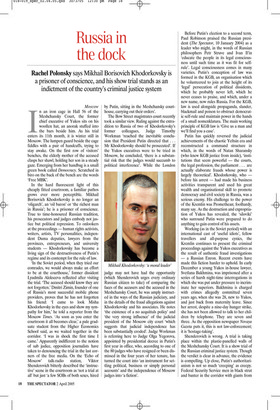Russia in the dock
Rachel Polonsky says Mikhail Borisovich Khodorkovsky is a prisoner of conscience, and his show trial stands as an indictment of the country’s criminal justice system
Moscow
In an iron cage in Hall 56 of the Meshchansky Court, the former chief executive of Yukos sits on his woollen hat, an anorak stuffed into the bars beside him. As his trial enters its 11th month, it is winter still in Moscow. The lumpen guard beside the cage fiddles with a pair of handcuffs, trying to stay awake. On the first row of visitors’ benches, the elderly mother of the accused clasps her shawl, holding her son in a steady gaze. Emerging from her handbag is a small green book called Democracy. Scratched in biro on the back of the bench are the words ‘Free MBK’.
In the hard fluorescent light of this cheaply fitted courtroom, a familiar pathos grows ever more perceptible. Mikhail Borisovich Khodorkovsky is no longer an ‘oligarch’, an ‘oil baron’ or ‘the richest man in Russia’; he is a prisoner of conscience. True to time-honoured Russian tradition, his prosecutors and judges embody not justice but political repression. To onlookers at the proceedings — human rights activists, writers, artists, TV personalities, independent Duma deputies, lawyers from the provinces, entrepreneurs, and university students — Khodorkovsky has become a living sign of the destructiveness of Putin’s regime and its contempt for the rule of law.
‘In the Soviet period, when they tried our comrades, we would always make an effort to be at the courthouse,’ former dissident Lyudmila Alekseeva reflected after visiting the trial. ‘The accused should know they are not forgotten.’ Dmitri Zimin, founder of one of Russia’s most successful mobile phone providers, proves that he has not forgotten his friend: ‘I came to look Misha Khodorkovsky in the eyes and show my sympathy for him,’ he told a reporter from the Moscow Times. ‘As soon as you enter the courtroom it all becomes clear,’ a pale graduate student from the Higher Economics School said, as we waited together in the corridor. ‘I was in shock the first time I came.’ Apparently indifferent to the notion of sub judice, opposition journalists have taken to denouncing the trial in the last corners of the free media. On the ‘Echo of Moscow’ talk-radio station, Viktor Shenderovich bitterly described the ‘instructive’ scene in the courtroom as ‘not a trial at all’ but just ‘a few SOBs of both sexes, hired by Putin, sitting in the Meshchansky courthouse, carrying out their orders’.
The Bow Street magistrates court recently took a similar view. Ruling against the extradition to Russia of two of Khodorkovsky’s former colleagues, Judge Timothy Workman ‘reached the inevitable conclusion that President Putin directed that ... Mr Khodorkovsky should be prosecuted’. If the Yukos executives were to be tried in Moscow, he concluded, ‘there is a substantial risk that the judges would succumb to political interference’. While the London judge may not have had the opportunity (which Shenderovich urges every ordinary Russian citizen to take) of comparing the faces of the accusers and the accused in the Meshchansky Court, he was amply instructed in the ways of the Russian judiciary, and in the details of the fraud allegations against Khodorkovsky and his associates. He notes ‘the existence of a no acquittals policy’ and ‘the very strong influence’ of the judicial president of the Moscow city court ‘which suggests that judicial independence has been substantially eroded’. Judge Workman is referring here to Judge Olga Yegorova, appointed by presidential decree in Putin’s first year in office, who, according to one of the 80 judges who have resigned or been dismissed in the four years of her tenure, has turned the court into ‘an instrument for settling political, business or simply personal accounts’ and the independence of Moscow judges into ‘a fiction’. Before Putin’s election to a second term, Paul Robinson praised the Russian president (The Spectator, 10 January 2004) as a leader who might, in the words of Russian philosophers Petr Struve and Ivan Il’in ‘educate the people in its legal consciousness until such time as it was fit for selfrule’. Legal consciousness comes in many varieties. Putin’s conception of law was formed in the KGB, an organisation which he volunteered to join at the height of its ‘legal’ persecution of political dissidents, which he probably never left, which he never ceases to praise, and which, under a new name, now rules Russia. For the KGB, law is used alongside propaganda, slander, blackmail and poison to obstruct democratic self-rule and maintain power in the hands of a small nomenklatura. The main working principle of KGB law is ‘Give us a man and we’ll find you a case’.
Putin has quickly reversed the judicial achievements of the chaotic Yeltsin era and reconstructed a command structure in which, in the words of Natan Sharansky (who knew KGB justice from inside), ‘institutions that seem powerful — the courts, the legal profession, the parliament ... are actually elaborate frauds whose power is largely theoretical’. Khodorkovsky, who before his arrest — had made his business activities transparent and used his great wealth and organisational skill to promote democracy and civil society in Russia, was a serious enemy. His challenge to the power of the Kremlin was Promethean; foolhardy, many say. As the destruction and expropriation of Yukos has revealed, the ‘siloviki’ who surround Putin were prepared to do anything to gain control of his assets.
Working (as in the Soviet period) with an international cast of ‘useful idiots’, fellow travellers and all-purpose cynics, the Kremlin continues to present the criminal proceedings against the Yukos executives as the result of authentic fraud investigations — a Russian Enron. Recent events have made this fiction harder to uphold. In early December a young Yukos in-house lawyer, Svetlana Bakhmina, was imprisoned after a series of harsh night-time interrogations in which she was put under pressure to incriminate her superiors. Bakhmina is charged with crimes allegedly committed seven years ago, when she was 28, new to Yukos, and just back from maternity leave. Since her arrest, despite a nine-day hunger strike, she has not been allowed to talk to her children by telephone. They are seven and three. As the opposition newspaper Novaya Gazeta puts it, this is not law-enforcement; it is ‘hostage-taking’.
Shenderovich is wrong. A trial is taking place within the plastic-panelled walls of the Meshchansky Court. It is a show trial of the Russian criminal justice system. Though the verdict is clear in advance, the evidence is compelling. Up close, Putin’s authoritarianism is not so much ‘creeping’ as creepy. Federal Security Service men in black strut and banter in the corridor with giants from the special forces. Khodorkovsky and Platon Lebedev (the former business partner who now shares his cage) are led swiftly from the cells, each handcuffed to a guard. Khodorkovsky turns and smiles at his wife. Lebedev, chronically ill but denied appropriate medical attention, keeps his eyes down. The defence lawyers, some donnish, others young and smart, follow them into the courtroom. On the far side, behind their laptops, sit the prosecutors Shokhin and Arkhipov, clammy-looking men in grubby uniforms of peacock blue with epaulettes. Shokhin smirks; he has nothing to prove. After a three-hour testimony in early March in which Khodorkovsky pleaded his innocence, asserted pride in his business achievements, and methodically answered every charge in his indictment, Shokhin declined to cross-examine him, remarking only that everything the accused had said was ‘falsehood thought up by his lawyers’. The judges let it pass. Arkhipov, who resembles a hungover waiter of the late Soviet period, speaks only occasionally, formulating interventions so idiotic that the whole courtroom laughs aloud while he blushes and grins.
Nothing in the seedy stylistics of Khodorkovsky’s humiliation is accidental. Three female judges sit on a raised bench at the end of the room. They look (and are remunerated) like two primary school teachers flanking a malevolent head mistress. The judge on the right, blonde and fey, gazes absently into space, yawning now and again, as Khodorkovsky or Lebedev explains banking practices in the early 1990s or tax optimisation schemes in Siberian ‘offshores’. The judge on the left, a huge, pitiably ill-favoured woman, frowns into the cage with pained attention. Between them, under the crest of the Russian Federation, hunches Judge Irina Kolesnikova, quintessence of Soviet bureaucracy, her eyes invisible behind white-rimmed spectacles. In barely-concealed collusion with the prosecution, she flicks through the criminal code, locating outlandish technicalities with which to reject evidence from the defence. At times the prisoners laugh incredulously at her triumphs of formalism. Konstantin Rivkin, an advocate for Lebedev, claims never to have encountered ‘procedural cynicism of such magnitude’.
In the Moscow show trials of the 1930s the court was filled with brainwashed Stalinists, certain that the accused were an ‘organised criminal group’ of ‘enemies of the people’. Visitors to the Meshchansky Court typically come away feeling that, as Lebedev declared from the cage in one of his more acerbic moments, the only ‘organised criminal group’ in evidence is the prosecution, of which the judges are, quite clearly, a part. ‘I was quite indifferent to Mikhail Khodorkovsky and his business when he was Russia’s biggest capitalist,’ the crime novelist Boris Akunin reflected after witnessing the proceedings, ‘but the behaviour of this man before and after his arrest arouses my respect.’ Khodorkovsky chose to stay in Russia when he faced arrest. He could be living abroad now, Akunin observes, enjoying his money like the other ‘disgraced oligarchs’. Instead he chose to plead his innocence in a Moscow court. The trial is an exercise in legal consciousness-raising. As Akunin says, both Khodorkovsky and Lebedev are enduring it ‘with great dignity’. For Khodorkovsky’s willing sacrifice of freedom and for the purposes to which he has dedicated his imprisonment, the veteran human rights lawyer Yuri Schmidt recently called him ‘the moral leader of our society’. His stature has been transformed. ‘In prison he is thinking not about his company but about the history of Russia,’ the political columnist Yulia Latynina says, ‘that’s why he’s in prison ... not like a businessman, like Nelson Mandela.’ Like the others he has unwillingly brought down with him, Khodorkovsky faces years in TB-ridden cells, overcrowded with convicts, many of whom should also be at home. But Putin will still not be rid of him. In a deeper sense, which Russia’s history of unjust imprisonment disposes us to comprehend, the caged men in the Meshchansky Court are free, and their judges and accusers in bondage.






























































 Previous page
Previous page